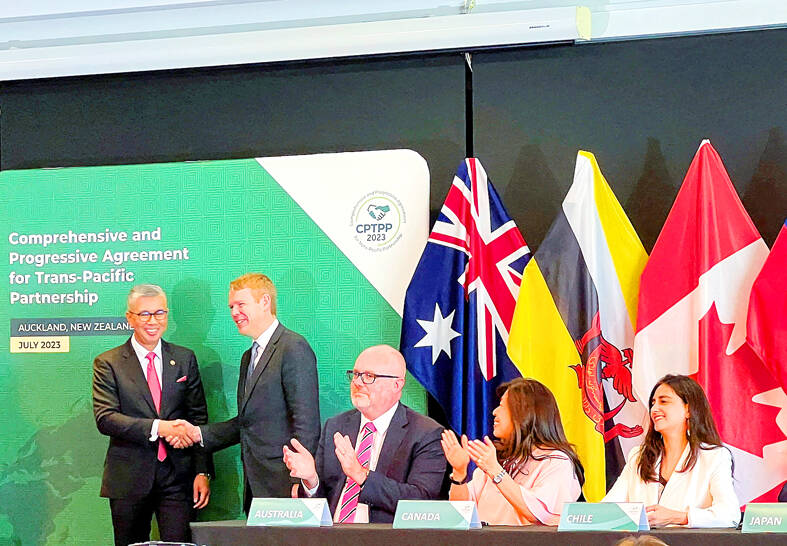The UK officially yesterday became the 12th member of a trans-Pacific trade pact which includes Japan, Australia and Canada, as it seeks to deepen ties in the region and build its global trade links after leaving the EU.
The UK last year announced it would join the Comprehensive and Progressive Agreement for Trans-Pacific Partnership (CPTPP) in its biggest trade deal since Brexit.
The accession means the UK would be able to apply CPTPP trade rules and lower tariffs with eight of the 11 existing members from yesterday — Brunei, Chile, Japan, Malaysia, New Zealand, Peru, Singapore and Vietnam.

Photo: REUTERS
The agreement enters into force with Australia on Tuesday next week, and would apply with the final two members — Canada and Mexico — 60 days after they ratify it.
The pact represents the UK’s first free-trade deals with Malaysia and Brunei, but while it had agreements with the other countries, CPTPP provisions go further, especially in giving companies choices on how to use “rules of origin” provisions.
The CPTPP does not have a single market for goods or services, and so regulatory harmonization is not required, unlike the EU, whose bloc the UK left at the end of 2020.
The UK estimates the pact might be worth £2 billion (US$2.5 billion) a year in the long run — less than 0.1 percent of GDP.
However, in a sign of the strategic, rather than purely economic, implications of the pact, the UK could now influence whether applicants China and Taiwan would be able to join the group.
The free-trade agreement has its roots in the US-backed Trans-Pacific Partnership, developed in part to counter China’s growing economic dominance.
The US pulled out in 2017 under then-president Donald Trump and the pact was reborn as the CPTPP.
Costa Rica is the next applicant country to go through the process of joining, while Indonesia also aims to do so.

STIMULUS PLANS: An official said that China would increase funding from special treasury bonds and expand another program focused on key strategic sectors China is to sharply increase funding from ultra-long treasury bonds this year to spur business investment and consumer-boosting initiatives, a state planner official told a news conference yesterday, as Beijing cranks up fiscal stimulus to revitalize its faltering economy. Special treasury bonds would be used to fund large-scale equipment upgrades and consumer goods trade-ins, said Yuan Da (袁達), deputy secretary-general of the Chinese National Development and Reform Commission. “The size of ultra-long special government bond funds will be sharply increased this year to intensify and expand the implementation of the two new initiatives,” Yuan said. Under the program launched last year, consumers can

Citigroup Inc and Bank of America Corp said they are leaving a global climate-banking group, becoming the latest Wall Street lenders to exit the coalition in the past month. In a statement, Citigroup said while it remains committed to achieving net zero emissions, it is exiting the Net-Zero Banking Alliance (NZBA). Bank of America said separately on Tuesday that it is also leaving NZBA, adding that it would continue to work with clients on reducing greenhouse gas emissions. The banks’ departure from NZBA follows Goldman Sachs Group Inc and Wells Fargo & Co. The largest US financial institutions are under increasing pressure

FUTURE TECH: Nvidia CEO Jensen Huang would give the keynote speech at this year’s Consumer Electronics Show, which is also expected to highlight autonomous vehicles Gadgets, robots and vehicles imbued with artificial intelligence (AI) would once again vie for attention at the Consumer Electronics Show (CES) this week, as vendors behind the scenes would seek ways to deal with tariffs threatened by US president-elect Donald Trump. The annual Consumer Electronics Show opens formally in Las Vegas tomorrow, but preceding days are packed with product announcements. AI would be a major theme of the show, along with autonomous vehicles ranging from tractors and boats to lawn mowers and golf club trollies. “Everybody is going to be talking about AI,” Creative Strategies Inc analyst Carolina Milanesi said. “From fridges to ovens

Twenty years after he was a young, struggling actor in Toronto, Thomas Lo (盧瑞麟) is now the one giving young Asian actors their big breaks. He just had to go to Hong Kong to do it. The Chinese Canadian has been the creative director of one of the territory’s biggest TV broadcasting companies for only a few years, but is already making original English-language content to reach viewers around the world. “It was a bit of a full-circle moment for me,” Lo said. “You see more Asians, but you’re still seeing the same Asians on screen, right? We’re looking for more opportunities